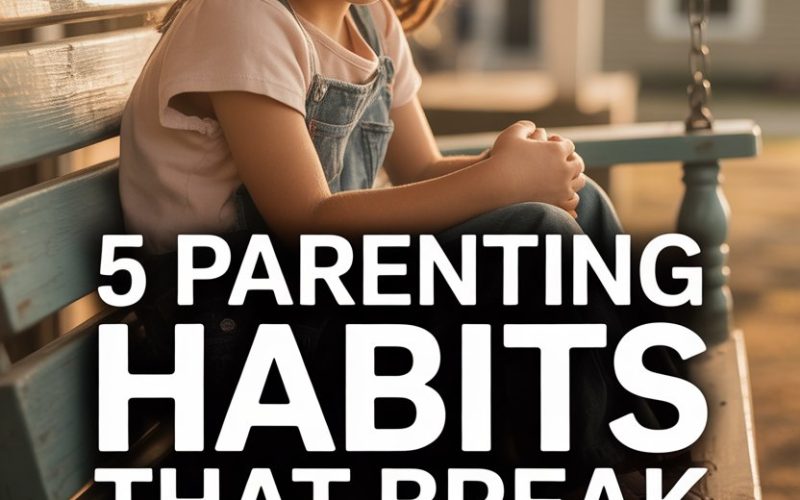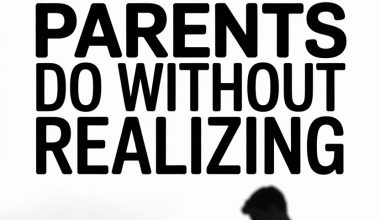Some parenting slip-ups are like stepping on a LEGO in the dark: you don’t realise the damage until it’s too late and someone’s in tears.
The thing is, most parents aren’t plotting to raise grumpy or anxious kids. Life just gets busy, patience runs thin, and before you know it, a few dodgy habits have quietly crept in.
Here’s five parenting habits that can chip away at a child’s confidence and character over time—and swap them out for something better (and less likely to make your future self cringe).
1. Micromanaging Every Move
Ever find yourself hovering next to your child as they tie their shoelaces, fighting the urge to just do it for them because you’re late (again)?
Or maybe you’re always a few paces behind, ready to swoop in and fix that spelling mistake, rearrange their backpack, or cut the crusts off their sandwiches “just right.”
It’s easy to slip into this habit, especially when you’re flat out and just want things done.
Trouble is, this kind of micromanagement quietly sends the message: “I don’t trust you to handle things.” And kids—clever as they are—notice.
According to a Clinical Psychologist, children who are micromanaged are more likely to struggle with decision-making, problem-solving, and managing their own emotions.
Over time, they can become anxious or overly dependent on adults to get things right.
Tonight, try this: Pick one task your child usually fumbles (or that makes your eye twitch just watching), and stand back.
Bite your tongue, stuff your hands in your pockets, and let them have a go—even if their version of “brushed hair” looks suspiciously like bedhead. Praise the effort, not the result.
2. Criticizing More Than Encouraging
Snapping off a “Why can’t you listen for once?” or “You’re always so messy!” is as tempting as chocolate biscuits after a long day.
But constant criticism, even the low-grade, muttered-under-your-breath kind, can leave lasting dents.
A study published in the Journal of Experimental Child Psychology found that children exposed to frequent criticism are less likely to try new things, admit mistakes, or share their feelings.
They hear criticism far louder than encouragement, and it’s sticky—clinging to their self-worth far longer than we’d like.
Here’s the challenge: For every correction or critique, follow up with two bits of encouragement or praise.
Caught them leaving their shoes in the hallway? “Shoes go by the door, please. Also, you remembered to hang up your coat—brilliant!” It feels odd at first, but it’s a game-changer.
And if you can’t find something to praise? Sometimes a smile and a silly face work wonders—no words needed.
3. Dismissing Their Feelings
Your child is weepy over a broken toy, furious about broccoli, or scared of shadows lurking in the hall. It’s tempting to brush it off. “You’re fine.” “Don’t be silly.” “Big kids don’t cry over that.”
But here’s the kicker: consistently minimising those big (and sometimes baffling) emotions teaches kids that their feelings aren’t valid.
Emotional resilience isn’t about bottling things up; it’s about learning to ride the emotional rollercoaster and bounce back.
Research shows that validating a child’s feelings—even when you’re internally rolling your eyes—helps them feel heard and equips them to handle hard stuff down the track.
Tonight, give it a go: Instead of “You’re fine,” try, “It looks like you’re really upset about that. Want to talk, or do you need a cuddle?”
Often, the storm passes faster when kids feel understood.
4. Modelling Stress or Anger as Normal
Kids don’t miss a trick. The way you handle spilled milk, late bills, or epic traffic jams is absorbed like a sponge soaks up tea.
Lose your cool every time something goes wrong, and kids learn that explosions are the expected response to life’s hiccups.
American Psychological Association points out that when parents frequently display stress or anger, children’s own stress levels go up, too.
They’re more likely to develop anxiety or mimic those reactions when things go pear-shaped.
Nobody expects you to be a Zen monk. But showing your child what it looks like to take a deep breath, apologise when you snap, or even laugh at the chaos, is powerful. “Wow, I’m cross about this mess, but yelling won’t help.
Let’s see how fast we can clean it up together.” It’s not about pretending to be calm; it’s about showing what healthy coping looks like.
(Bonus: Apologising to your child when you mess up models accountability, not weakness.)
5. Comparing Them to Siblings or Other Kids
“Why can’t you be more like your sister?” or “Ben down the road never forgets his lunch.” Sound familiar?
Even the subtlest comparisons plant seeds of insecurity, jealousy, or resentment—none of which make for a happy family dinner.
Research from the University of Dayton found that children who are regularly compared to siblings or peers are more prone to low self-esteem, anxiety, and even sibling rivalry that lingers well into adulthood.
Nobody likes feeling like they’re always falling short.
Instead, zero in on your child’s unique strengths. “You have such a creative way of doing things!” or “I love how you always help your little brother.”
If you catch yourself about to compare, bite your tongue—maybe even literally, if necessary. Celebrate progress and character, not competition.
Raising Resilient Kids—One Habit at a Time
Parenting isn’t about being perfect—it’s about showing up, learning from your missteps, and making tiny course corrections before your kid turns into a grumpy teenager who only communicates in grunts.
These five habits can sneak in on even the most well-meaning parents. The good news? Swapping them out doesn’t require superhuman patience or a parenting PhD.
Just a bit of self-awareness, a smidge of humility, and a willingness to try something a little different—starting tonight, or perhaps after you’ve had a strong cuppa.
One less comparison, a little more encouragement, and a dash of patience with shoelaces or feelings can make all the difference. Your future adult child (and your current sanity) will thank you.




